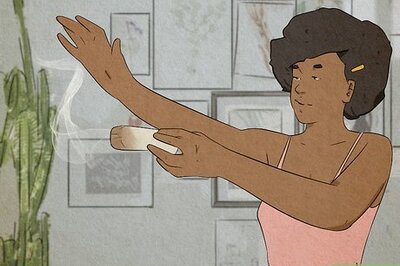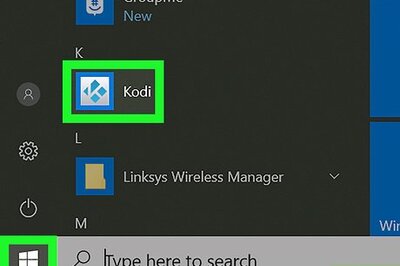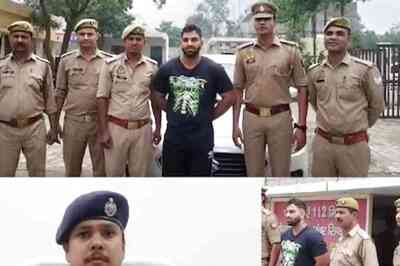
views
The government does not have any data to show that same-sex marriage is an “urban elitist concept”, the Supreme Court said on Wednesday while hearing a batch of petitions seeking legal validation for gay marriages in the country.
“State cannot discriminate against an individual on the basis of a characteristic over which the individual does not have control. When you see it as innate characteristics then it counters urban elitist concept.. urban perhaps because more people are coming out of the closet. Government does not have any data also to show that same sex marriage is an urban elitist concept,” CJI DY Chandrachud said, as reported by Bar and Bench.
The remark by the chief justice of India came in response to the Centre calling same-sex marriages an “urban elitist concept”, far removed from the social ethos of the country. The Centre had on Sunday asked Supreme Court to dismiss all petitions seeking its legal recognition.
Ahead of the hearing on April 18, the Centre filed a fresh application before the Supreme Court, raising questions on the maintainability of the petitions, saying that the extension of the concept of matrimony beyond heterosexual union is “tantamount to creating a new social institution”.
Centre said as the prayers made would entail the judicial creation of a social institution called “marriage” of a different kind than contemplated under the existing law.
The government also informed the top court that any further creation of rights, recognition of relationships and giving legal sanctity to same-sex relationships can be done only by the competent legislature and not by judicial adjudication.
The application also said that petitions seeking legal recognition of same-sex marriage issues have far-reaching implications and the petitioners seeking such recognition do not represent the view of the entire population of the nation.
“The competent legislature will have to take into account broader views and voice of all rural, semi-rural and urban population, views of religious denominations keeping in mind personal laws as well as and customs governing the field of marriage together with its inevitable cascading effects on several other statutes,” the Centre said.
The government further argued that conventional and universally accepted socio-legal relationships across all religions, are “deeply rooted in the Indian social context and indeed is considered a sacrament in all branches of Hindu law. Even in Islam, though it is a contract, it is a sacred contract and a valid marriage is only between a biological male and a biological woman”.
It further added that such petitions “merely reflect urban elitist views and cannot be compared with the appropriate legislature which reflects the views and voices of a far wider spectrum and expands across the country.”
The affidavit stated that marriage is a socio-legal institution which can be created, recognised, conferred with legal sanctity and regulated only by the competent legislature by way of an Act under Article 246 of the Constitution of India.
“It is submitted that therefore, it is the humble request of the applicant the issues raised in the present petition be left to the wisdom of the elected representatives of the people who alone shall be the democratically viable and legitimate source through which any change in the understanding and/or the creation/recognition of any new social institution can take place,” the Centre said.
Earlier, the Centre claimed such petitions will cause “complete havoc” with the delicate balance of personal laws and accepted societal values.
The government submitted that despite the decriminalisation of Section 377 of the IPC, which had criminalised consensual gay sex in private, the petitioners cannot claim a fundamental right to same-sex marriage to be recognised under the laws of the country.
“Marriage, as an institution in law, has many statutory and other consequences under various legislative enactments. Therefore, any formal recognition of such a human relationship cannot be regarded as just a privacy issue between two adults,” it said.
The Centre said the institution of marriage between two individuals of the same gender is neither recognised nor accepted in uncodified personal laws or codified statutory laws.
Five-judge bench hearing plea
A bench of Chief Justice D Y Chandrachud and justices S K Kaul, S Ravindra Bhat, P S Narasimha and Hima Kohli commenced the hearing on April 18 on the petitions which were referred to a larger bench for an authoritative pronouncement on March 13 by the CJI-led bench, saying it is “very seminal issue”.
The hearing and the consequential outcome will have significant ramifications for the country where common people and political parties hold divergent views on the subject.
Opposition to Pleas Seeking Validation of Same-sex Marriages
Jamiat Ulama-i Hind has also opposed the petitions saying they are an attack on the family system and in complete contravention of all personal laws.
Seeking intervention in the batch of petitions pending before the top court, the organisation also cited Hindu traditions, saying the aim of marriage among Hindus is not merely physical pleasure or procreation but spiritual advancement.
It is one of the 16 ‘sanskars’ in Hindus, the Jamiat said. “This concept of same-sex marriage goes to attack the family system rather than making a family through this process,” it said.
The National Commission for Protection of Child Rights (NCPCR) has also opposed the batch of pleas seeking recognition of same-sex marriage before the Supreme Court of India. In an application, NCPCR claimed that the adoption of children by a same-sex couple would affect the child in “social and psychological aspects”.
The child rights body claimed that allowing the adoption to same-sex couples is akin the endangering the children, according to a report by Bar and Bench.
The application further claimed that giving children to be raised by “persons having issues would be like exposing children to struggle just for experimentation.” It was argued that this was not in the children’s interest.
Same-sex parents may have limited exposure to traditional gender role models and hence, children’s exposure would be limited and their overall personality growth would be affected, NCPCR claimed.
It further stated that the existing legal system concerning children does not envision same-sex couples having custody over / adopting children.
Notably, the Hindu Adoption and Maintenance Act uses the words “spouse” and “wife”, while laying down the ability to adopt only for Hindu males and females.
Consequently, it does not apply to same-sex couples, the application stated.
It concluded that a proper legislative system is required to be adopted regarding same-sex couples, only then they should be allowed to adopt children.
Delhi Commission For Protection of Child Rights Supports Petition
However, the Delhi Commission For Protection of Child Rights (DCPCR) supported the petition saying the Centre and state governments should take steps to create public awareness that same sex family units are “normal”.
It said multiple studies on same-sex parenting have demonstrated that same sex couples can be good parents.
Referring to examples of countries that have legalised same-sex marriages, the child rights body said at present more than 50 countries allow same-sex couples to legally adopt children.
SC’s View On The Issue
While referring the pleas to the constitution bench, the court had said the submissions on the issue involve an interplay between constitutional rights on the one hand and special legislative enactments, including the Special Marriage Act, on the other.
“Having due regard to the broader context of the petitions before this court, the inter-relationship between the statutory regime and constitutional rights, we are of the considered view that it would be appropriate if the issues raised are resolved by a constitution bench of five-judges of this court…,” the bench had said while referring to Article 145 (3) of the Constitution and calling it a “very seminal issue”.
“We accordingly direct that the hearing of these petitions be placed before a constitution bench,” the apex court said while posting the pleas for hearing on April 18.
Article 145(3) of Constitution says there should be at least five judges to hear cases that involve a substantial question of law as to the interpretation of the Constitution, or any reference under article 143, which deals with the power of the President of India to consult the Supreme Court.
The court said in the batch of pleas, the petitioners have sought recognition of the rights of couple of the same gender to marry, and while relying upon the apex court verdicts on right to privacy and decriminalising section 377 of the Indian Penal Code, they have asserted broader constitutional entitlements arising out of right to life and personal liberty, right to dignity and others.
The bench had said one of the issues raised before it also relates to the rights of transgender couples to marry.
Solicitor General Tushar Mehta had told the bench that marriage is not just a contract in case of Hindu law which it is in the Mohammedan law.
“When the question of granting recognition, legal sanction to a relationship is concerned, that is essentially a function of the legislature and for more than one reason,” he said.
The apex court had, on January 6, clubbed and transferred to itself all such petitions pending before different high courts, including the Delhi High Court.
On December 14 last year, it had sought the Centre’s response to two pleas seeking a transfer of the petitions pending in the Delhi High Court for directions to recognise same-sex marriages to itself.
Prior to that, on November 25 last year, the apex court had sought the Centre’s response to separate pleas moved by two gay couples seeking enforcement of their right to marry and a direction to the authorities concerned to register their marriages under the Special Marriage Act.
A bench headed by CJI Chandrachud, who was also part of the Constitution bench that in 2018 decriminalised consensual gay sex, issued a notice to the Centre in November last year, besides seeking Attorney General R Venkataramani’s assistance in dealing with the pleas.
The top court’s five-judge Constitution bench, in a path-breaking unanimous verdict delivered on September 6, 2018, held that consensual sex among adult homosexuals or heterosexuals in private space is not a crime while striking down a part of the British-era penal law that criminalised it on the ground that it violated the constitutional right to equality and dignity.
Read all the Latest India News here
















Comments
0 comment